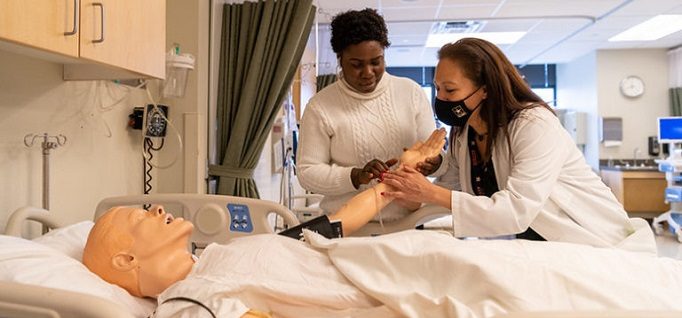Training virtually for care technician certificates
By Debra Dennis
March 30, 2022
Early in her life, Lisa LaBruce dreamed of becoming a nurse.
But the fear of needles made her squeamish and sent her to non-clinical occupations like administrative assistant, executive secretary and financial analyst. It always nagged her, however, that she was not working in a medical field where she could help improve health outcomes for others.
Now, with the help of Dallas College, her desire to serve patients is finally being realized – albeit virtually.
LaBruce is in the final leg of the newly launched virtual care program at Dallas College. Armed with a patient care technician certification and a Google IT support professional certificate, LaBruce is now on the third leg of her journey; she is enrolled in an externship at the University of Texas (UT) Southwestern, a partner in Dallas College’s virtual care program.
“It’s like I’ve hit the reset button,” LaBruce said. “I feel, to be honest, bona fide. I’m patient care technician-certified now. I’m Google certified. What I do with this is on me. I have options. I can put that on my resume. I can get in.”
Her new career is taking off. The training, she said, has left her confident and inspired.
“It’s fast-paced. There’s so much information but if you learn it, if you hang in there, you will succeed,” LaBruce said. She cares deeply about her patients and their health – albeit it virtually.
Hybrid format
The pandemic challenged traditional care and nursing programs were forced to pivot, said Alisa Jones, senior director of workforce development at Dallas College.
“The pandemic upended everything including how we interact with our doctors, medical support staff and nurses,” Jones said. “You know when you go to an ER and that first person you see before you see the doctor, is a patient care technician. They’re doing an assessment of what the issues are in terms of why you’re there. A patient care technician can effectively check vital (signs).”
The virtual care program is taught in a hybrid format to help the technicians adjust to a setting that puts them behind the computer and behind the camera to interact with their patients.
Students learn to count breathing, assess, question and schedule medical visits. They also discuss symptoms of both common and complex medical conditions in what is fast becoming a preferred means of providing patient care.
As the pandemic continues, virtual care – video conferencing between patient and medical staff – has become a preferred means of assessing medical maladies, in some instances. At Dallas College, virtual care is among the school’s continuing education programs, Jones said. This program allows students to train for a career in virtual care in less than a year, she said.
Flexible schedule
Kendall Beerwinkle said she likes the program because she can provide a level of care with patients online that’s comparable to what they would receive during face-to-face appointments.
“It’s important to be attentive and caring,” Beerwinkle said. “Some patients are nervous about this so you have to put them at ease and always display a professional demeanor.”
Beerwinkle entered the program after her dog-sitting/home-sitting business dried up with the onset of the pandemic. She had a healthy business with four employees.
I really wanted to work from home, and I wanted to work with patients,” said Beerwinkle who also has ophthalmology assistant and medical front office certificates.
“This is something that really interested me because we get to really look at body language and tell if a patient is in pain or have other symptoms that you watch out for. Are they coughing a lot or blowing their nose a lot, or do they need an ambulance? This program teaches you about assessing a patient and determining what they really need.”
Attaining a Google IT certificate was a plus, Beerwinkle said.
There’s more to the story! Read the full article in CC Daily.



